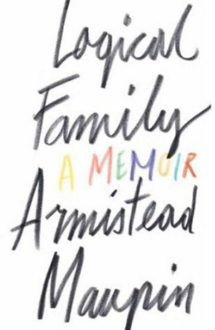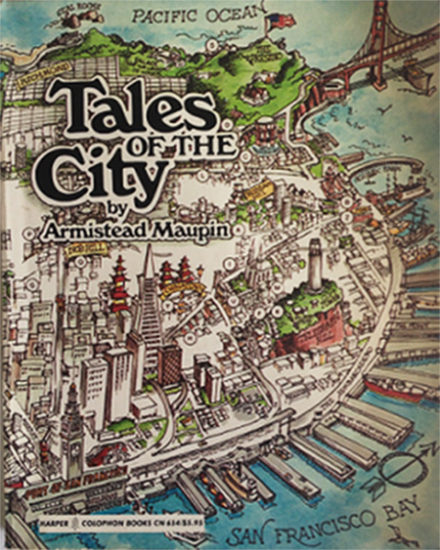 Logical Family:
Logical Family:
A Memoir
by Armistead Maupin
Published by Harper
Published October 3, 2017
History (memoir)
304 pgs. • Find on Amazon.com • WorldCat
Reviewed by Stephen O. Murray
February 2, 2018.
Having attended many book-promotion appearances of Armistead Maupin (1944– ) and read more than a few interviews of him, along with all the Tales of the City books, I expected that I would be already familiar with much in his new memoir, Logical Family. It turned out that, even on subjects of which I’ve heard him speak (such as being a protégé of the very deplorable Senator Jesse Helms), his accounts were new to me. (Maybe I’d heard more and forgotten?…).
Considering how many deaths occur in his narrative, and the pain he recalls of trying to please his father and to remain closeted, the book is quite breezy, not unlike Tales of the City. The shifting of focus on particular characters also resembles Tales of the City, though the chapters are more self-contained than the serial/novel.
 Maupin is a storyteller with a well-developed touch of finding ironies in behavior, both is own and that of others. He is bemused by his young right-wing self and not very harsh even on being a dupe of Richard Nixon’s campaign, returning to Vietnam after mustering out of the U.S. Navy in a propaganda ploy directed by John Ehrlichman and Bob Harldeman (who launched the “war on drugs” as well as trying to cover up White House instigation of the Watergate break-in). Maupin is very funny about his visit to the Nixon White House (the photo from the photo-op is included in the memoir).
Maupin is a storyteller with a well-developed touch of finding ironies in behavior, both is own and that of others. He is bemused by his young right-wing self and not very harsh even on being a dupe of Richard Nixon’s campaign, returning to Vietnam after mustering out of the U.S. Navy in a propaganda ploy directed by John Ehrlichman and Bob Harldeman (who launched the “war on drugs” as well as trying to cover up White House instigation of the Watergate break-in). Maupin is very funny about his visit to the Nixon White House (the photo from the photo-op is included in the memoir).
I enjoyed reading the book and looking at the pictures that precede each chapter, though I was not always aware of who else was in some of the photos, especially the early ones. And I don’t think the title is apt. It seems to me that more of the book is about his natal (blood) family than about the gay/lesbian family he built in San Francisco. Indeed, the family of choice (a better label IMHO) is mostly slighted with the exception of some celebrities (Rock Hudson, Christopher Isherwood, Ian McKellan, Laura Linney). At times the memoir of complicated relationships with parents and grandparents seems punctuated by a memoir of some celebrity friends.
There is nothing about the ending (and, if I correctly recall resumption/return) of the serial in the San Francisco Chronicle and then the (would-be) rival San Francisco Examiner (the last four volumes were written as books, not newspaper serial installments), I was also disappointed at the lack of mention of leaving San Francisco for New Mexico (Tesuque) for a while and then returning.
Nonetheless, I was interested in revelation of some of those who were inspirations for various of his characters (though he readily concedes that there is some of himself in all his characters), and for the location of the fictional Barbary Lane (primarily Macondray Lane—on which he never lived, though he lived on Russian Hill and explored many of the “streets” that are flights of steps rather than roadways).
If there is a single theme of the somewhat rambling (but relatively short) book it is that the self-suppression of closetry is very toxic. In addition to his own example (a rightwing virgin until well into his 20s), there is clear but pained analysis of the costs of keeping a secret life secret in the case of Rock Hudson.
Maupin is a generous writer, if perhaps a bit too willing to forgive (his former self as well as other bigots) without forgetting. I’ll readily concede that his generosity is preferable to bitter railing and injustice collecting.
P.S. There are two particular points that I would challenge. I don’t see how anyone who purports to have read Christopher Isherwood’s diaries could claim that Isherwood was “never bitchy” and, having been there, I am absolutely sure that, after the impromptu candlelight march from the Castro to City Hall the night of the assassinations of Harvey Milk and George Moscone, there were speakers—I remember Harry Britt and Cleve Jones—before Joan Baez sang “Amazing Grace.” That reverberated through UN Plaza and returns as a high point of Maupin’s memoir.
©2018, Stephen O. Murray

